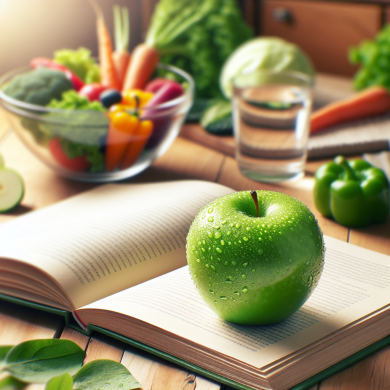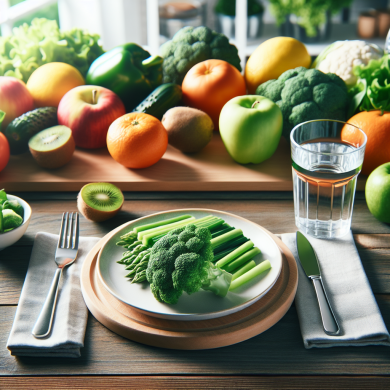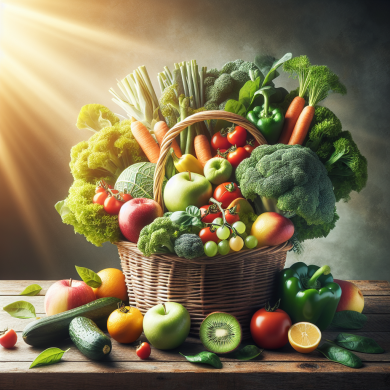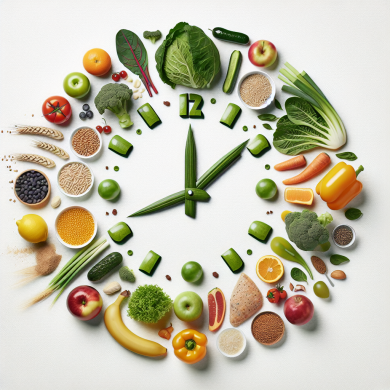Top Whole Foods for Clean Eating Success
“`html
Introduction to Clean Eating
Clean eating has become increasingly popular as more people seek healthier lifestyles and diets devoid of processed foods. At its core, clean eating emphasizes consuming whole, unrefined foods as close to their natural state as possible. This approach not only nourishes the body but also supports sustainable practices and promotes overall well-being. In this article, we will explore the top whole foods that are essential for clean eating success.
Fruits and Vegetables: Nature’s Nutrient Powerhouses
Fruits and vegetables are fundamental to any clean eating plan due to their high nutrient density and low-calorie content. They are rich in vitamins, minerals, fiber, and antioxidants, which play a critical role in maintaining optimal health.
Leafy Greens
Leafy greens like spinach, kale, and Swiss chard are staples in clean eating. These vegetables are packed with essential nutrients such as vitamin K, vitamin A, calcium, and iron. They are also rich in antioxidants, which help combat oxidative stress and inflammation in the body.
Berries
Berries, including strawberries, blueberries, and raspberries, are not only delicious but also incredibly nutritious. They are high in fiber and vitamin C and are known for their powerful antioxidant properties. Berries can be enjoyed fresh or frozen and make a perfect addition to smoothies, oatmeal, or salads.
Cruciferous Vegetables
Cruciferous vegetables like broccoli, cauliflower, and Brussels sprouts are another important category in clean eating. These vegetables are known for their cancer-fighting compounds, such as sulforaphane, and are rich in fiber, vitamins C and K, and folate. Including a variety of cruciferous vegetables in your diet can support detoxification processes and promote digestive health.
Whole Grains: Fueling the Body with Energy
Whole grains are an essential part of a clean eating diet, providing complex carbohydrates, fiber, and a range of vitamins and minerals. Unlike refined grains, whole grains retain their bran and germ, which contain valuable nutrients.
Quinoa
Quinoa is a versatile, gluten-free grain that is high in protein and contains all nine essential amino acids, making it a complete protein source. It is also rich in fiber, magnesium, and phosphorus. Quinoa can be used as a base for salads, pilafs, or as a side dish to any meal.
Brown Rice
Brown rice is a whole grain that is less processed than white rice, retaining its nutrient-rich bran and germ. It is a good source of manganese, selenium, and magnesium, and provides sustained energy. Brown rice can be used in a variety of dishes, from stir-fries to soups.
Oats
Oats are a popular whole grain known for their heart-healthy benefits. They are packed with soluble fiber, particularly beta-glucan, which helps reduce cholesterol levels and improve heart health. Oats can be enjoyed in oatmeal, granola, or baked goods.
Lean Proteins: Building Blocks for the Body
Proteins are essential for the body’s growth, repair, and maintenance. Choosing lean protein sources helps maintain muscle mass while supporting overall health.
Chicken Breast
Chicken breast is a popular lean protein choice that is low in fat and high in protein. It is an excellent source of B vitamins, which support energy metabolism and brain health. Grilled, baked, or roasted chicken breast can be added to various dishes for a protein boost.
Fish
Fish, particularly fatty fish like salmon, mackerel, and sardines, are rich in omega-3 fatty acids, which are essential for heart and brain health. Fish is also an excellent source of high-quality protein, vitamin D, and selenium. Incorporating fish into your diet at least twice a week can provide numerous health benefits.
Legumes
Legumes, including beans, lentils, and chickpeas, are plant-based protein sources that are high in fiber and low in fat. They are also rich in iron, folate, and other essential nutrients. Legumes can be used in soups, stews, salads, or as a meat substitute in various recipes.
Nuts and Seeds: Small but Mighty
Nuts and seeds are nutrient-dense foods that provide healthy fats, protein, fiber, and a variety of vitamins and minerals. They make for convenient snacks and versatile ingredients in clean eating meals.
Almonds
Almonds are a popular nut choice due to their high content of healthy monounsaturated fats, vitamin E, and magnesium. They have been linked to heart health benefits and can be enjoyed raw, roasted, or in the form of almond butter.
Chia Seeds
Chia seeds are tiny but powerful seeds that are rich in omega-3 fatty acids, fiber, and protein. They can absorb liquid and form a gel-like consistency, making them ideal for puddings, smoothies, and as an egg substitute in baking.
Flaxseeds
Flaxseeds are another excellent source of omega-3s, fiber, and lignans, which have antioxidant properties. Ground flaxseeds are easier for the body to digest and can be added to smoothies, oatmeal, or baked goods for a nutritional boost.
Healthy Fats: Essential for Optimal Functioning
Healthy fats are crucial for brain function, hormone production, and the absorption of fat-soluble vitamins. Including sources of healthy fats in a clean eating diet is important for overall health.
Avocado
Avocado is a unique fruit that is high in heart-healthy monounsaturated fats. It is also rich in fiber, potassium, and vitamins C, E, and K. Avocados can be sliced onto toast, blended into smoothies, or mashed into guacamole.
Olive Oil
Olive oil is a staple in Mediterranean diets and is known for its numerous health benefits. It is high in monounsaturated fats and antioxidants, which support heart health and reduce inflammation. Olive oil can be used in dressings, marinades, or for sautéing vegetables.
Coconut Oil
Coconut oil is a plant-based fat that is solid at room temperature. It is rich in medium-chain triglycerides (MCTs), which are metabolized differently than other fats and can be used as a quick source of energy. Coconut oil is suitable for cooking at high temperatures and can be used in baking or frying.
Conclusion
Clean eating is not just a diet; it is a lifestyle choice that prioritizes whole, unprocessed foods for optimal health and well-being. By incorporating a variety of fruits, vegetables, whole grains, lean proteins, nuts, seeds, and healthy fats into your diet, you can successfully embrace clean eating. These nutrient-dense foods provide the essential vitamins, minerals, and antioxidants needed to support a healthy lifestyle. Start by making small changes and gradually incorporating these top whole foods into your daily meals to achieve clean eating success.
“`















Add comment